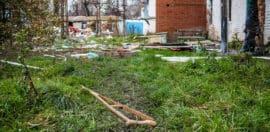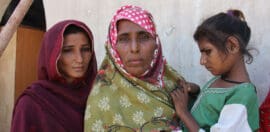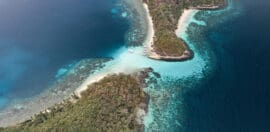Foreign aid falls flat but advocates welcome lift in Afghan refugee intake

30 March 2022 at 11:47 am
Increasing the number of places for people fleeing from Afghanistan has been welcomed, but the budget has been labelled “a missed opportunity for fairness” with refugees and people seeking asylum left behind and only a small increase seen for foreign aid.
While Tuesday’s budget brought only a marginal increase to the underlying foreign aid budget, the federal government did announce it will almost double the number of refugees to be resettled from Afghanistan over the next four years.
In a move broadly welcomed by the development sector the government has ended a freeze on the indexation of aid funding.
This will see it increase by up by 2.5 per cent in the coming year, hitting around $4.5 billion, up from an originally estimated $4.335 billion in 2021-22, however it will then bounce around over the next four years.
The budget also included a two-year $324.4 million package for the Pacific and Timor-Leste to help COVID-19 recovery, plus a ring-fenced $85 million for COVAX to tackle vaccine global inequity; and $65 million on humanitarian aid to Ukraine.
But Oxfam Australia chief executive Lyn Morgain said the budget lacked ambition at a time of need.
“At a time of rapidly escalating need and growing inequality across the globe, this federal budget fails to demonstrate the leadership that is required from a nation like Australia,” Morgain said.
“While Oxfam welcomes the marginal increase in aid funding through indexation, a lift in the humanitarian intake for people from Afghanistan and an enhanced focus on gender equality, these measures don’t come close to meeting current global challenges.”
She said that the government needed to accept its place in the global economy – with all the responsibilities that entails.
“While Australian aid and development spending remains relatively stagnant in the coming years, defence, security and intelligence spending has increased,” she said.
“This formula will not deliver peace, stability and prosperity for the region. We need quality, long-term development programs that forge closer links and improve the lives of people experiencing poverty and injustice.”
Australia’s peak body for aid NGOs, the Australian Council for International Development (ACFID) also welcomed the decision to increase the budget, but it too called on the government to end the temporary nature of some aid measures.
Marc Purcell, CEO of ACFID, said the development reversals created by COVID-19 will last over a decade.
“Our Pacific relationships are not temporary – and our funding model needs to reflect this. Temporary measures and ‘base’ assistance are confusing our long-term intentions and relationships in the region. This outdated framing needs to be dropped,” Purcell said.
“We need to continue to increase our investments in long-term, quality development programming to lift the livelihoods of people across the region. Building human security based on Pacific priorities is the pathway to closer cooperation, people-to-people links and greater stability.”
Plan International Australia CEO Susanne Legena said the budget did not provide the “ambitious and targeted new investments” that were urgently needed to address the threats facing the region: climate change, the ongoing impacts of COVID-19, and humanitarian crises.
“While the return of indexation has resulted in an increase in our overseas development budget, Australia is still well behind in contributing its fair share to global aid efforts – which has fallen by more than half in the last decade from contributing 3.7 per cent of global aid in 2011 to a pitiful 1.6 per cent in 2020,” Legena said.
“Development assistance remains one of the most impactful investments alongside diplomatic efforts to influence and support equity, peace and economic development in the region and the world over.”
Additional places for people fleeing from Afghanistan
Striking a more positive note, the budget did include $665.9 million over the next four years for an additional 16,500 places for people fleeing from Afghanistan.
It comes off the back of a number advocacy campaigns including #ActionForAfghanistan, which saw 162,000 people sign a petition; and Christians United For Afghanistan, which received backing from every mainline Christian denomination, as well as the Australian Christian Lobby.
Reverend Tim Costello, the executive director of Micah Australia, thanked everyone involved in the advocacy campaign.
“Together we have lifted our calls up to the Australian government and everyone involved should feel proud knowing an additional 16,500 Afghans will be able to seek refuge in Australia as a result,” he said.
“However, our support must not end here. From Afghanistan and Myanmar to Ukraine, there is greater conflict and instability. The Australian government must increase its aid program and long-term investment in development cooperation and humanitarian assistance.”
Human rights lawyer Arif Hussein, also from the Afghanistan-Australian Advocacy Network, said the announcement was the leadership they had longed for since the fall of Kabul in August 2021.
“Affording an additional 16,500 people with a pathway to safety in Australia is the right and compassionate thing for Australia to do,” Hussein said.
“There are thousands of people in our community desperate to reunite with their families, commitments such as this ensure some families can live in safety together.”
However, he said there were further barriers that could be removed to ensure this, whilst also protecting those most vulnerable.
“We can also offer permanent protection to all those here in Australia that have fled. We can also expedite processing so people don’t need to spend another moment in danger. An increased intake is a welcomed step and we hope this is the turning point towards compassion and further action,” he said.
‘A missed opportunity for fairness’
Despite the increase in places for people fleeing from Afghanistan, overall the government kept Australia’s humanitarian intake at a maximum of 13,750 people in 2022-23, down from the target of 18,750 places in 2019-2020.
Moreover, while the budget in general centred around the challenges faced by the cost of living increases, the Asylum Seeker Resource Centre said that refugees and people seeking asylum were largely left behind.
The $1.5 billion in Cost of Living Payment providing $250 in economic support will not be provided to people seeking asylum and refugees on temporary visas.
The government included $1.28 billion in 2022-23 to maintain its onshore immigration detention regime.
Kon Karapanagiotidis OAM, CEO and founder of ASRC, said the budget will see refugees on temporary visas excluded from the cost of living assistance, not provided universal safety nets or permanent protection.
“Additionally, expenditure continues to be wasted on the chaotic, cruel and broken detention and offshore processing system,” he said.
“The additional humanitarian intake from Afghanistan, thanks to the tireless work of people from Afghanistan in Australia, is welcome. However, this budget was a missed opportunity to correct the many issues with our current immigration and refugee system.”
Our 2022 budget coverage is brought to you by Fifty Acres.







